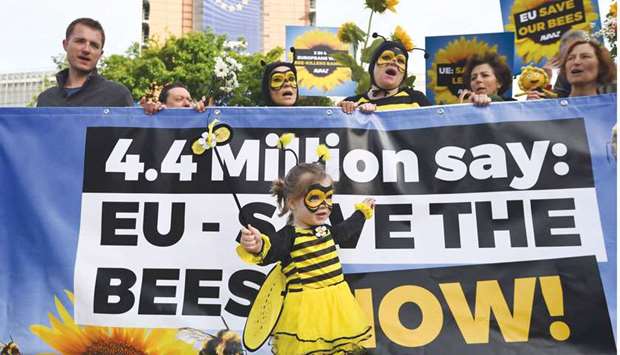A trio of pesticide chemicals and their producers got stung yesterday as EU countries said their use must be stopped if the continent doesn’t want to see its bee population collapse.
The action was prompted by a scientific review saying that the outdoor use of the trio of active substances used in pesticides – clothianidin, imidacloprid and thiamethoxam, collectively known as neonicotinoids – damage the central nervous system of insects, including that of bees.
The European Commission decision brought cheers from environmental advocates, but a buzz of scepticism from chemical companies and pesticide manufacturers.
Bees pollinate many crops.
Thus, any decrease in their numbers poses economic and food supply concerns.
“Bee health remains of paramount importance for me since it concerns biodiversity, food production and the environment,” said European Health and Food Safety Commissioner Vytenis Andriukaitis.
Following the approval of the ban by European Union member states, all outdoor use of the neonicotinoids in question will be banned.
The use of the substances will still be allowed in greenhouses, where bees are not expected to be exposed to them.
The regulation is expected to go into effect by the end of the year.
Pesticide Action Network (PAN) Europe, a collection of non-governmental organisation working to minimise the harmful effects of pesticides, said the decision marked an “historic day” for Europe.
“Authorising neonicotinoids during a quarter of a century was a mistake and led to an environmental disaster,” said Martin Dermine, PAN Europe’s health and environment policy officer.
However, the decision was met with criticism by pharmaceutical companies that produce the soon-to-be-banned substances.
Pharmaceutical giant Bayer has said that the ban was “not warranted” because the pesticides were safe “when used in accordance with the label instructions”.
The decision is “a bad deal for the European agricultural sector and the environment, and one that will not improve the lot of bees or other pollinators”, the company said in a statement.
The ban could move the EU towards a ban on nearly every agricultural chemical, industry leader Syngenta, which is the other big producer of neonicotinoids, said in Basel.
“Syngenta does not believe today’s decision is the right outcome for European farmers or for the environment,” said the Switzerland-based corporation, which is owned by Chinese state company ChemChina.
Syngenta, which makes the now-banned thiamethoxam, said that the EU’s Bee Risk Guidance Document that underpinned yesterday’s decision was flawed.
The document “is so conservative and so far removed from the reality of agriculture that its application would see most, if not all agricultural chemicals banned, including for example, those used in organic agriculture”, the world’s largest crop protection firm said.

Activists stage a demonstration yesterday to call upon European member states to protect the bees by voting a full ban on bee-killing pesticides, in front of the European Commission in Brussels.
